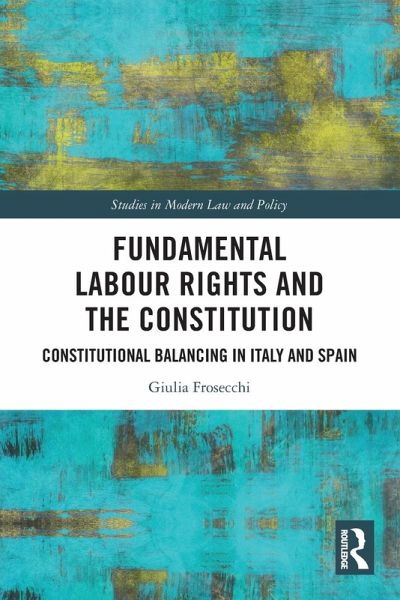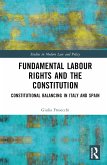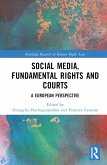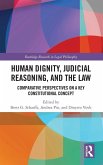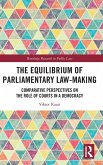Giulia Frosecchi
Fundamental Labour Rights and the Constitution
Constitutional Balancing in Italy and Spain
Giulia Frosecchi
Fundamental Labour Rights and the Constitution
Constitutional Balancing in Italy and Spain
- Broschiertes Buch
- Merkliste
- Auf die Merkliste
- Bewerten Bewerten
- Teilen
- Produkt teilen
- Produkterinnerung
- Produkterinnerung
This book reflects on constitutional balancing from the perspective of fundamental labour rights. It reviews the theoretical debates on judicial balancing and the approaches adopted by the Court of Justice of the European Union and the European Court of Human Rights, to proceed with a closer assessment of Italian and Spanish judicial traditions.
Andere Kunden interessierten sich auch für
![Fundamental Labour Rights and the Constitution Fundamental Labour Rights and the Constitution]() Giulia FrosecchiFundamental Labour Rights and the Constitution195,99 €
Giulia FrosecchiFundamental Labour Rights and the Constitution195,99 €![Social Media, Fundamental Rights and Courts Social Media, Fundamental Rights and Courts]() Social Media, Fundamental Rights and Courts152,99 €
Social Media, Fundamental Rights and Courts152,99 €![Human Rights Defenders and the Law Human Rights Defenders and the Law]() Núria Saura-FreixesHuman Rights Defenders and the Law42,99 €
Núria Saura-FreixesHuman Rights Defenders and the Law42,99 €![Judicial Dissent in European Constitutional Courts Judicial Dissent in European Constitutional Courts]() Katalin KelemenJudicial Dissent in European Constitutional Courts182,99 €
Katalin KelemenJudicial Dissent in European Constitutional Courts182,99 €![Human Dignity, Judicial Reasoning, and the Law Human Dignity, Judicial Reasoning, and the Law]() Human Dignity, Judicial Reasoning, and the Law152,99 €
Human Dignity, Judicial Reasoning, and the Law152,99 €![The Equilibrium of Parliamentary Law-making The Equilibrium of Parliamentary Law-making]() Viktor KazaiThe Equilibrium of Parliamentary Law-making137,99 €
Viktor KazaiThe Equilibrium of Parliamentary Law-making137,99 €![Business, Religion and the Law Business, Religion and the Law]() Matteo CorsaliniBusiness, Religion and the Law63,99 €
Matteo CorsaliniBusiness, Religion and the Law63,99 €-
-
-
This book reflects on constitutional balancing from the perspective of fundamental labour rights. It reviews the theoretical debates on judicial balancing and the approaches adopted by the Court of Justice of the European Union and the European Court of Human Rights, to proceed with a closer assessment of Italian and Spanish judicial traditions.
Hinweis: Dieser Artikel kann nur an eine deutsche Lieferadresse ausgeliefert werden.
Hinweis: Dieser Artikel kann nur an eine deutsche Lieferadresse ausgeliefert werden.
Produktdetails
- Produktdetails
- Studies in Modern Law and Policy
- Verlag: Taylor & Francis Ltd
- Seitenzahl: 200
- Erscheinungstermin: 19. Dezember 2024
- Englisch
- Abmessung: 156mm x 233mm x 17mm
- Gewicht: 320g
- ISBN-13: 9780367725716
- ISBN-10: 0367725711
- Artikelnr.: 72111608
- Herstellerkennzeichnung
- Libri GmbH
- Europaallee 1
- 36244 Bad Hersfeld
- gpsr@libri.de
- Studies in Modern Law and Policy
- Verlag: Taylor & Francis Ltd
- Seitenzahl: 200
- Erscheinungstermin: 19. Dezember 2024
- Englisch
- Abmessung: 156mm x 233mm x 17mm
- Gewicht: 320g
- ISBN-13: 9780367725716
- ISBN-10: 0367725711
- Artikelnr.: 72111608
- Herstellerkennzeichnung
- Libri GmbH
- Europaallee 1
- 36244 Bad Hersfeld
- gpsr@libri.de
Giulia Frosecchi is researcher and lecturer of labour law and European social law at the University of Florence, Italy.
List of abbreviations
Introduction: From the EU crisis to constitutional balancing
1 Constitutional balancing of fundamental labour rights
1.1 Introduction
1.2 Constitutional balancing as a method and its theoretical justifications
1.2.1 Against constitutional balancing
1.2.2 The balancing actors
1.2.3 The axiological nature of fundamental labour rights
1.3 Balancing technique(s)
1.3.1 The proportionality test, a critique
1.4 Balancing in fundamental social rights' adjudication and the essential
content dilemma
1.4.1 Italian and Spanish insights on the notion of essential content
1.5 Conclusions
2 Constitutional balancing techniques in the world: A glimpse
2.1 Introduction
2.2 A worldwide panoramic of constitutional balancing
2.3 Balancing in supranational courts
2.3.1 The CJEU way of balancing: a labour reading
2.3.2 The ECtHR way of balancing: a labour reading
2.3.3 On reasonableness
2.3.4 Around values, balancing and proportionality in supranational courts
2.4 A reappraisal of constitutional balancing in Italy and Spain
2.4.1 Balancing in the Italian constitutional case law
2.4.2 Applied balancing in the Spanish constitutional case law and the
principle of proportionality
2.4.3 Financial and economic factors in the Constitutional Courts' case law
2.5 Conclusions
3 Italian and Spanish post-crisis case law and "its" fundamental labour
rights
3.1 Introduction
3.2 The relevant Italian post-crisis case law
3.2.1 Public employees' wage reduction before the Court
3.2.2 Retirement benefits revaluation and the modulation of the Court
3.2.3 On compensation for unjustified dismissal
3.3 The relevant Spanish post-crisis case law
3.3.1 The first and comprehensive judgment on the 2012 labour reform
3.3.2 The second and consistent judgment, one year later
3.4 Fundamental labour rights in the balance
3.4.1 The right to work
3.4.2 The right to collective bargaining
3.4.3 The right to a sufficient and proportionate remuneration and the
principle of adequacy of pensions in the Italian case law
3.5 Conclusions
4 Constitutional balancing in the Italian and Spanish post-crisis case law
4.1 Introduction
4.2 The role of the Courts
4.3 The technique applied to supervise the legislator's balancing
4.3.1 The principle of reasonableness that permeates the Italian
constitutional post-crisis case law
4.3.2 The stone guest of the Spanish constitutional post-crisis case law:
the principle of proportionality
4.4 The terms balanced
4.4.1 The Italian post-crisis case law and the public financial
contingencies
4.4.2 The Spanish post-crisis case law and the overriding fight against
unemployment
4.4.3 The economic crisis argument, in the balance?
4.4.4 An uncontroversial axiological term: the freedom to conduct a
business
4.5 Conclusions
Conclusions
Bibliography
Index
Introduction: From the EU crisis to constitutional balancing
1 Constitutional balancing of fundamental labour rights
1.1 Introduction
1.2 Constitutional balancing as a method and its theoretical justifications
1.2.1 Against constitutional balancing
1.2.2 The balancing actors
1.2.3 The axiological nature of fundamental labour rights
1.3 Balancing technique(s)
1.3.1 The proportionality test, a critique
1.4 Balancing in fundamental social rights' adjudication and the essential
content dilemma
1.4.1 Italian and Spanish insights on the notion of essential content
1.5 Conclusions
2 Constitutional balancing techniques in the world: A glimpse
2.1 Introduction
2.2 A worldwide panoramic of constitutional balancing
2.3 Balancing in supranational courts
2.3.1 The CJEU way of balancing: a labour reading
2.3.2 The ECtHR way of balancing: a labour reading
2.3.3 On reasonableness
2.3.4 Around values, balancing and proportionality in supranational courts
2.4 A reappraisal of constitutional balancing in Italy and Spain
2.4.1 Balancing in the Italian constitutional case law
2.4.2 Applied balancing in the Spanish constitutional case law and the
principle of proportionality
2.4.3 Financial and economic factors in the Constitutional Courts' case law
2.5 Conclusions
3 Italian and Spanish post-crisis case law and "its" fundamental labour
rights
3.1 Introduction
3.2 The relevant Italian post-crisis case law
3.2.1 Public employees' wage reduction before the Court
3.2.2 Retirement benefits revaluation and the modulation of the Court
3.2.3 On compensation for unjustified dismissal
3.3 The relevant Spanish post-crisis case law
3.3.1 The first and comprehensive judgment on the 2012 labour reform
3.3.2 The second and consistent judgment, one year later
3.4 Fundamental labour rights in the balance
3.4.1 The right to work
3.4.2 The right to collective bargaining
3.4.3 The right to a sufficient and proportionate remuneration and the
principle of adequacy of pensions in the Italian case law
3.5 Conclusions
4 Constitutional balancing in the Italian and Spanish post-crisis case law
4.1 Introduction
4.2 The role of the Courts
4.3 The technique applied to supervise the legislator's balancing
4.3.1 The principle of reasonableness that permeates the Italian
constitutional post-crisis case law
4.3.2 The stone guest of the Spanish constitutional post-crisis case law:
the principle of proportionality
4.4 The terms balanced
4.4.1 The Italian post-crisis case law and the public financial
contingencies
4.4.2 The Spanish post-crisis case law and the overriding fight against
unemployment
4.4.3 The economic crisis argument, in the balance?
4.4.4 An uncontroversial axiological term: the freedom to conduct a
business
4.5 Conclusions
Conclusions
Bibliography
Index
List of abbreviations
Introduction: From the EU crisis to constitutional balancing
1 Constitutional balancing of fundamental labour rights
1.1 Introduction
1.2 Constitutional balancing as a method and its theoretical justifications
1.2.1 Against constitutional balancing
1.2.2 The balancing actors
1.2.3 The axiological nature of fundamental labour rights
1.3 Balancing technique(s)
1.3.1 The proportionality test, a critique
1.4 Balancing in fundamental social rights' adjudication and the essential
content dilemma
1.4.1 Italian and Spanish insights on the notion of essential content
1.5 Conclusions
2 Constitutional balancing techniques in the world: A glimpse
2.1 Introduction
2.2 A worldwide panoramic of constitutional balancing
2.3 Balancing in supranational courts
2.3.1 The CJEU way of balancing: a labour reading
2.3.2 The ECtHR way of balancing: a labour reading
2.3.3 On reasonableness
2.3.4 Around values, balancing and proportionality in supranational courts
2.4 A reappraisal of constitutional balancing in Italy and Spain
2.4.1 Balancing in the Italian constitutional case law
2.4.2 Applied balancing in the Spanish constitutional case law and the
principle of proportionality
2.4.3 Financial and economic factors in the Constitutional Courts' case law
2.5 Conclusions
3 Italian and Spanish post-crisis case law and "its" fundamental labour
rights
3.1 Introduction
3.2 The relevant Italian post-crisis case law
3.2.1 Public employees' wage reduction before the Court
3.2.2 Retirement benefits revaluation and the modulation of the Court
3.2.3 On compensation for unjustified dismissal
3.3 The relevant Spanish post-crisis case law
3.3.1 The first and comprehensive judgment on the 2012 labour reform
3.3.2 The second and consistent judgment, one year later
3.4 Fundamental labour rights in the balance
3.4.1 The right to work
3.4.2 The right to collective bargaining
3.4.3 The right to a sufficient and proportionate remuneration and the
principle of adequacy of pensions in the Italian case law
3.5 Conclusions
4 Constitutional balancing in the Italian and Spanish post-crisis case law
4.1 Introduction
4.2 The role of the Courts
4.3 The technique applied to supervise the legislator's balancing
4.3.1 The principle of reasonableness that permeates the Italian
constitutional post-crisis case law
4.3.2 The stone guest of the Spanish constitutional post-crisis case law:
the principle of proportionality
4.4 The terms balanced
4.4.1 The Italian post-crisis case law and the public financial
contingencies
4.4.2 The Spanish post-crisis case law and the overriding fight against
unemployment
4.4.3 The economic crisis argument, in the balance?
4.4.4 An uncontroversial axiological term: the freedom to conduct a
business
4.5 Conclusions
Conclusions
Bibliography
Index
Introduction: From the EU crisis to constitutional balancing
1 Constitutional balancing of fundamental labour rights
1.1 Introduction
1.2 Constitutional balancing as a method and its theoretical justifications
1.2.1 Against constitutional balancing
1.2.2 The balancing actors
1.2.3 The axiological nature of fundamental labour rights
1.3 Balancing technique(s)
1.3.1 The proportionality test, a critique
1.4 Balancing in fundamental social rights' adjudication and the essential
content dilemma
1.4.1 Italian and Spanish insights on the notion of essential content
1.5 Conclusions
2 Constitutional balancing techniques in the world: A glimpse
2.1 Introduction
2.2 A worldwide panoramic of constitutional balancing
2.3 Balancing in supranational courts
2.3.1 The CJEU way of balancing: a labour reading
2.3.2 The ECtHR way of balancing: a labour reading
2.3.3 On reasonableness
2.3.4 Around values, balancing and proportionality in supranational courts
2.4 A reappraisal of constitutional balancing in Italy and Spain
2.4.1 Balancing in the Italian constitutional case law
2.4.2 Applied balancing in the Spanish constitutional case law and the
principle of proportionality
2.4.3 Financial and economic factors in the Constitutional Courts' case law
2.5 Conclusions
3 Italian and Spanish post-crisis case law and "its" fundamental labour
rights
3.1 Introduction
3.2 The relevant Italian post-crisis case law
3.2.1 Public employees' wage reduction before the Court
3.2.2 Retirement benefits revaluation and the modulation of the Court
3.2.3 On compensation for unjustified dismissal
3.3 The relevant Spanish post-crisis case law
3.3.1 The first and comprehensive judgment on the 2012 labour reform
3.3.2 The second and consistent judgment, one year later
3.4 Fundamental labour rights in the balance
3.4.1 The right to work
3.4.2 The right to collective bargaining
3.4.3 The right to a sufficient and proportionate remuneration and the
principle of adequacy of pensions in the Italian case law
3.5 Conclusions
4 Constitutional balancing in the Italian and Spanish post-crisis case law
4.1 Introduction
4.2 The role of the Courts
4.3 The technique applied to supervise the legislator's balancing
4.3.1 The principle of reasonableness that permeates the Italian
constitutional post-crisis case law
4.3.2 The stone guest of the Spanish constitutional post-crisis case law:
the principle of proportionality
4.4 The terms balanced
4.4.1 The Italian post-crisis case law and the public financial
contingencies
4.4.2 The Spanish post-crisis case law and the overriding fight against
unemployment
4.4.3 The economic crisis argument, in the balance?
4.4.4 An uncontroversial axiological term: the freedom to conduct a
business
4.5 Conclusions
Conclusions
Bibliography
Index

